
Bro Church is a medieval era Lutheran church at Bro on the Swedish island Gotland. Situated on what was possibly a pre-Christian sacred site, the presently visible church was built during the 13th century. Stylistically, its architecture shows a mix of Romanesque and Gothic elements. It still contains some medieval furnishings, including a baptismal font by Sigraf, and murals. The church belongs to the Väskinde parish in the Diocese of Visby of the Church of Sweden.
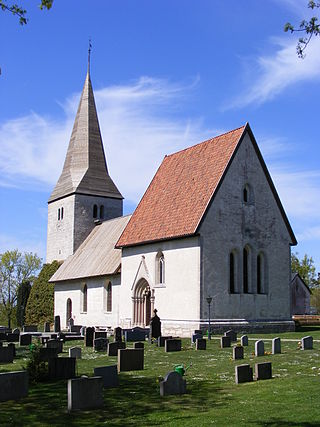
Fröjel Church is a medieval church in Fröjel on the Swedish island of Gotland. Fröjel Church may have been built to serve not only as a church, but also as a fortification. Stylistically, it is a mix of Romanesque and Gothic architecture, and contains murals from the early 14th century. It is associated with the Diocese of Visby of the Church of Sweden.
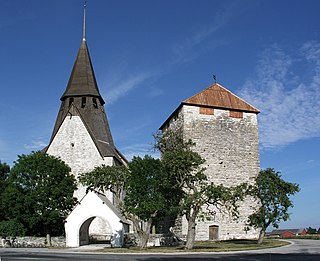
Gammelgarn Church is a medieval church in Gammelgarn on the Swedish island of Gotland. The largely Gothic church stands next to an older defensive tower. The church's main portal is richly decorated with medieval sculpture, and the interior contains an altarpiece from the 14th century of high craftsmanship. The church is in the Diocese of Visby of the Church of Sweden.

Ala Church is a medieval church in Ala on the Swedish island of Gotland. Its oldest parts date from the 12th century. Damaged by fire in the 1930s, it still contains medieval murals and its original baptismal font. The church belongs to the Church of Sweden and lies within the Diocese of Visby.

Alva Church is a medieval church in Alva on the Swedish island of Gotland. The oldest parts of the church date from the late 12th century; with the halted construction of the tower about a century later, building activity ceased. The church contains medieval murals as well as a number of medieval furnishings and pieces of art. It lies in the Diocese of Visby of the Church of Sweden.
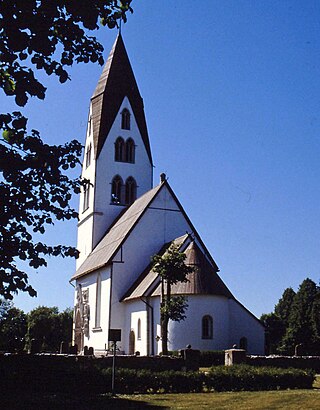
Stånga Church is a medieval church in Stånga on the Swedish island of Gotland. The site of the church has probably been considered sacred since before the Christianization of Scandinavia.
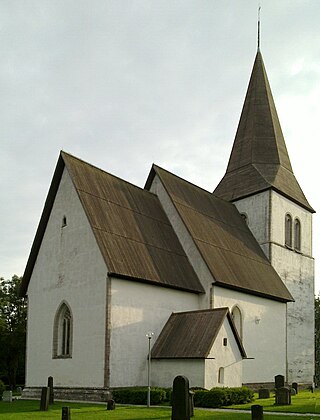
Etelmhem Church is a medieval church on the Swedish island of Gotland. The largely Gothic church contains medieval murals and a 12th-century baptismal font by the sculptor Hegvald. The church is used by the Church of Sweden and part of Diocese of Visby.

Boge Church is a medieval church in Boge not far from Slite on the Swedish island of Gotland. Its main construction period was during the 13th century, but the tower was rebuilt following its collapse in a storm during the 19th century. It contains sets of medieval murals. It belongs to the Church of Sweden and lies in the Diocese of Visby.

Fole Church is a medieval church in Fole on the Swedish island of Gotland. The Romanesque tower is the oldest part of the otherwise largely Gothic church. It belongs to the Church of Sweden and lies in the Diocese of Visby.
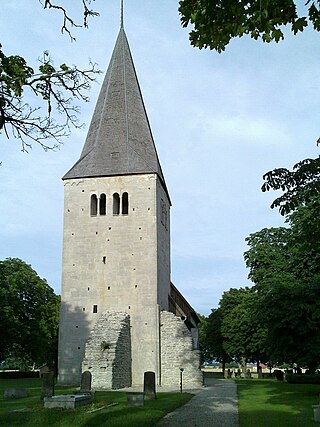
Follingbo Church is a medieval church in Follingbo on the Swedish island of Gotland. Its Romanesque nave and tower are noteworthy for the professionalism with which they were built. It lies in the Diocese of Visby and is used of the Church of Sweden.
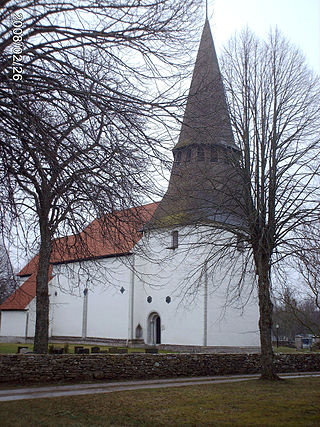
Hogrän Church is a medieval church in Hogrän on the Swedish island of Gotland. It was built in stages between the 12th and 14th century, and contains several medieval church fittings. It belongs to the Church of Sweden and lies in the Diocese of Visby.
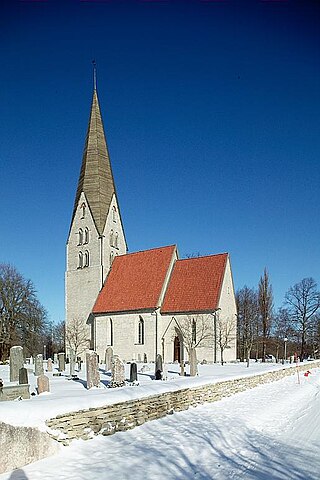
Klinte Church is a medieval church in Klinte on the Swedish island of Gotland, not far from Klintehamn. Finished around the 1300, it is a largely Gothic church. It is part of the Diocese of Visby.

Mästerby Church is a medieval church in Mästerby on the Swedish island of Gotland. It is richly decorated with medieval murals. Mästerby Church belongs to the Diocese of Visby.

Norrlanda Church is a medieval church on the Swedish island Gotland, in the Diocese of Visby.

Hejde Church is a medieval Lutheran church in Hejde on the island of Gotland It lies the Diocese of Visby.

Vall Church is a medieval church on the Swedish island of Gotland. The largely Romanesque church dates from the 13th century. It belongs to the Diocese of Visby.

Sjonhem Church is a medieval church on the island of Gotland, Sweden. It belongs to the Diocese of Visby.

Stenkumla Church is a medieval church in Stenkumla on the island of Gotland, Sweden. It belongs to the Diocese of Visby. During the Middle Ages, the church was dedicated to Saint Lawrence.

Vallstena Church is a medieval church on the island of Gotland, Sweden. It belongs to the Diocese of Visby.

Vänge Church is a medieval church in Vänge on the island of Gotland, Sweden. Its oldest parts date to circa 1200. It belongs to the Diocese of Visby.






















